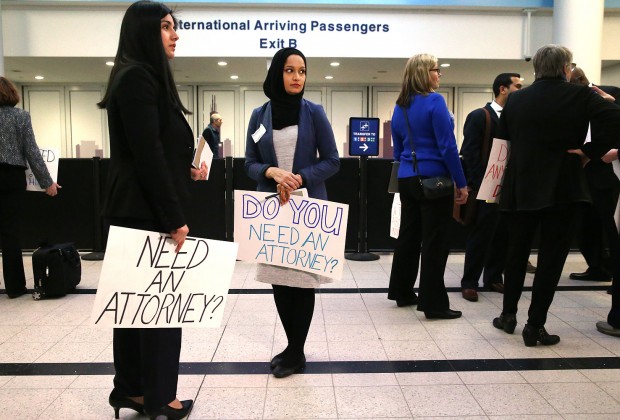Following the Supreme Court’s decision to partially restore President Donald Trump's travel ban earlier this week, pending a full decision this fall, the revised executive order will go into effect Thursday at 7 p.m.
This will block foreigners from six majority Muslim countries (Syria, Iran, Yemen, Libya, Sudan, and Somalia) who have no family or business ties from entering the United States.
In February, protests erupted at O’Hare airport and across the country after the president signed the order banning travelers from, at the time, seven nations. Hundreds of Chicago lawyers banded together providing legal assistance to affected travelers.
We caught up with Ahmed Rehab, executive director of the Council of American Islamic Relations Chicago, about what the organization expects when the ban is reinstated this evening.
What is CAIR doing to prepare for the reinstatement of the travel ban?
We’ve maintained the Travel Assistance Project since the first travel ban was put in place. All the attorneys who volunteered back in February are ready to provide assistance to those who may be affected by the ban being reinstated. We have attorneys on the ground at the airport, ready. We expect similar chaos as when the first ban was implemented. We are trying to be prepared on the ground.
Is this ban different from the previous ban?
It’s the same thing. The Supreme Court rolled back the freeze issued by the courts, and said anyone without a "bona fide" relationship [with American citizens or institutions] may be deported, or prevented from coming in.
What challenges do you foresee with the reinstatement of the ban?
The opinion issued by the court is problematic because it still leaves the ban open to interpretation—and the interpretation will be conservative. They will try to turn people away who shouldn't be turned away. In the meantime, we are trying to get as much information as possible to provide assistance as best we can.
What has the organization been doing in the interim?
We've continued the same work. We maintained the same website, same help, we've kept attorneys on the ground making sure people who have reached out to us are not encountering problems in their travels to the United States.
Have you seen a higher volume of calls after the Supreme Court ruling?
Yes, in the last week we've had several calls mostly from the six countries [affected]. They tell us they'll be traveling, and have asked for us to be [at the airport] in case they have any issues. We are helping 14 people today who have reached out to us.
What does the assistance look like on the inside?
If the person doesn't come out after a certain point, we try to level with the [customs and border] agents inside. We let them know the person has all the paperwork they need. If they are taken to a removal proceeding, we provide legal assistance and advocate for them. We make sure their valid paperwork is respected as such.



